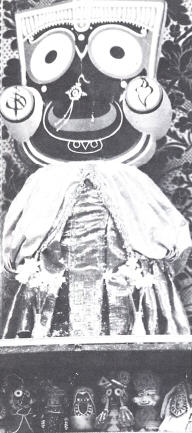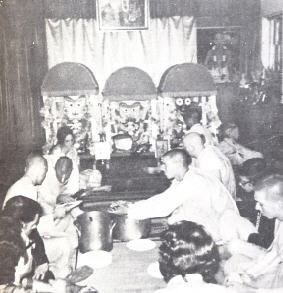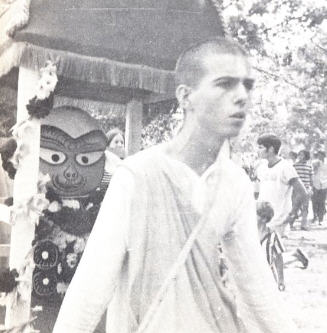
The nature of God is that He has unlimited qualities. It is not that He is without qualities. In the Bhagavad Gita, the Supreme Person describes Himself: "Of all that is material and all that is spiritual in this world, know for certain that I am both its origin and dissolution." In the Sanskrit of the Vedic scriptures His qualities are described as "nirguna," that is, they are beyond estimation. We can at least know that everything which we are seeing now is His quality, His energy. Therefore earth, stone and wood are His energy, and all colors are His energy. They are described as belonging to the Lord's external or inferior, material energy. But when this energy of the material world is combined according to authoritative direction, and a shape of the Supreme Lord is carved or shaped from it, then it is no longer material, it is spiritual. That is the version of all Vedic literatures. In this way, by the Mercy of the Absolute, a firm, easily worshipable link can be set up between the spiritual kingdom and those spirit souls who have temporarily fallen into the ignorance of material suffering.
In the Twelfth Chapter of Bhagavad Gita, Krishna the Supreme Personality of Godhead is asked by His disciple Arjuna, "Which form of worship is more perfect, devotional service unto Your Personal Form, or deliberation on Your impersonal unmanifested effulgence?" The Lord clearly declares, "He whose mind is fixed on My Personal Form, always engaged in worshiping Me with great and transcendental faith, is considered by Me to be most perfect." He further states, "For those whose minds are attached to the non-manifested, impersonal Feature of the Supreme, advancement is very troublesome. To make progress in that unmanifested discipline is always difficult for those who are embodied." Swami A.C. Bhaktivedanta elaborates on this point as follows: "It is very difficult for the embodied individual to simply theoretically understand that he is not the body. Therefore the Bhaktiyogi accepts the Deity of Krishna as worshipable because there is some bodily conception fixed in the mind of everyone, which can be applied. Of course, worship of the Supreme Lord in His Form within the temple is not idol worship. The Form of the Lord even in the material qualities, such as when made of stone, wood, or oil paint, is not actually material. That is the Absolute Nature of the Supreme Lord.
"A crude example may be given here: We may find some mailboxes on the street, and if we post our letters in these boxes, they will naturally go to their destination without any difficulty. But any old box, or an imitation, which we may find somewhere, which is not authorized by the post office, will not do the work. Similarly, God has an authorized representation in the Deity Form, which is called "Archa Vigraha." This Archa Vigraha is an incarnation of the Supreme Lord. God will accept service through that Form. The Lord is omnipotent and all-powerful; therefore, by His incarnation as Archa Vigraha, He can accept the service of the devotee, just to make it convenient for the man in conditioned life."
So the transformation of matter into spirit in the Deity Form of the Lord is an act done out of His kindness. In His Universal Form, as described in Chapter Eleven of the Gita, Lord Krishna manifests Himself as the entire cosmic manifestation, including all life and planetary systems. He is the Greatest of the great and He is also the Smallest of the small. For the ease of His parts and parcels who are estranged from Krishna Consciousness and trapped in the material world, He descends as incarnation in the Form of the most merciful Deity, such as Lord Jagannath. The Absolute Truth is inconceivable, beyond the reach of the philosophers' speculation, but the devotee who is willing to go back to Godhead can have easy access to Him. He can offer Him foodstuffs and eat the sanctified remnants, he can dress Him and glorify Him on the Rathayatra car journey. None of this is done whimsically or with any material sentiment, but strictly according to the rules chalked out by the great spiritual masters, who have themselves never disdained the presence of the Lord in the Deity Form. In a recent Deity installation ceremony at the Los Angeles temple, Swami A.C. Bhaktivedanta said, "The difference between idol worship and Deity worship is life. If there is no life, then it is idol worship, heathenism. And when there is life, feeling, then it is Krishna. We must think, 'Here is Krishna. I have to serve Him, I must do it very nicely.' If you think Jagannath is a wooden idol then He will remain a wooden idol to you forever. But if you elevate yourself to the higher platform of Krishna Consciousness, this Krishna will talk with you. At the time just after Lord Chaitanya, the Deity of Madan Mohan used to talk to the great devotee Sanatan Goswami. Sanatan had no temple. He was hanging his Deity on a tree. Madan Mohan was talking with him: 'Sanatan, you are bringing only a dry chapatti to offer Me, this chapatti is stale and if you don't give it a little salt, how can I eat?' Sanatan replied, 'Sir, where shall I go? Whatever I get I offer You. Kindly accept. I cannot move. I am an old man.' So Krishna had to eat whatever was offered. Because the devotee was offering, He could not refuse. Because the real thing is not what you offer, but your feeling: 'Krishna, kindly take. I have no qualification. I am rotten, false. But I have brought this thing for you, please take.' In that way it will be accepted."

Lord Jagannath is especially liberal and accessible to the aspirant devotee of Godhead. As for the history of the Appearance of the merciful Lord Jagannath, our spiritual master, A.C. Bhaktivedanta Swami, has often told the incident: Five thousand years ago, a great devotee and king named Subal requested a sculptor from one of the upper material planets to carve him a Form of Krishna commemorating Krishna's Appearance on His chariot at Kurukshetra when He was joined with His Brother Valaram and Sister Subadra. The sculptor certainly accepted the commission, but stated one positive condition. He said he must work in absolute privacy in his studio. King Subal agreed, and the work began. The king, however, grew impatient after what he thought was too long a time, and finally he could wait no longer but approached the sculptor's place and actually forced open the door. On sight of the king, the demigod sculptor disappeared, leaving behind the Deity Forms of Jagannath, Valaram and Subadra exactly as we know them today from the Rathayatra Festival. The king simply accepted the Forms of the statues as complete: "These will be my worshipable Deities." In other words, the king was in Krishna Consciousness. As in so many of such incidents involving devotees and seeming accidents, the whole thing was an arrangement by the Lord. This is most significantly confirmed in that Lord Chaitanya, the Avatar of Krishna Himself as a Devotee, has solidly taken Lord Jagannath as nondifferent from the Absolute Truth. In his biography of the life of Lord Chaitanya, Swami A.C. Bhaktivedanta relates that "At Puri when He entered the temple of Jagannath He [Lord Chaitanya] became at once saturated with transcendental ecstasy and fell down on the floor of the temple unconscious." Prabhupada has said that Chaitanya was in such convulsive ecstasy that He could only utter, "Jag, Jaga," but He was thinking, "Oh, Krishna, for so long I have wanted to see You, and now I can see You." Bhaktivinode Thakur, the great householder devotee in the line of disciplic succession from Lord Chaitanya, emphasized in an essay, "The Golden Avatar" (which appeared in issue number 25 of Back to Godhead), that he who can see the incarnation of the Deity within the shape of stone or wood is the perfect theist. And this is accessible not only to the stalwart realized saints, but to any person making a sincere offering with devotion.
On another occasion Bhaktivinode Thakur conclusively affirmed the Jagannath Deity as nondifferent from the Form of Absolute Truth. Some hundred years ago, the devotee Bhaktivinode was the magistrate of the city of Puri in India. At that time a yogi was going around the city proclaiming that he was himself God, Sri Vishnu, and he was getting some less intelligent people to accept him as the Supreme Lord. The yogi had developed the useless talent of breathing fire from his mouth and he was getting a lot of attention. As magistrate, Bhaktivinode called the man before him. "You say you are Lord Vishnu?" "Yes I am," the man insisted. Bhaktivinode also held the position of caretaker of the large Jagannath temple at Puri and he therefore invited the yogi, "If you are Vishnu, then why don't you go live with Lord Jagannath at the temple?" "What?" the yogi was disdainful of the suggestion, "Go live with some wooden idols?" At this gross mistake in transcendental reasoning, Bhaktivinode was convinced the man before him was not God but an imposter, and he had him imprisoned for false teachings. It is further told that, immediately after imprisoning this false "Vishnu," Bhaktivinode's family members became seriously ill. This continued for one or two days, and the townspeople began to speculate that maybe the fire-breathing yogi was actually God and that Bhaktivinode had committed a great blasphemy. But the Thakur was unflinching in his faith and assured his family that all would be well. After a few days their illness passed and the yogi finally confessed from prison that he had been indeed an imposter.

Let us finally stop petty arguments and accept that the unlimited Supreme Lord can, if and when He likes, enter any Form and any place, and He is not prohibited from entrance simply by the desire of the atheists. So many people facilely declare that "God is everything" and "God is everywhere." Why then do they not admit that He is also present in the temple and in the sculptured or painted Form of Lord Jagannath? For this is the actual case, according to the foremost transcendental authorities, the scriptures and the spiritual masters of Vaishnavism.
By and large, the people of this age are unfit to enter into spiritual affairs with the Lord; they cannot see anything beyond matter. In the Srimad Bhagwatam, Swami A.C. Bhaktivedanta writes of Krishna's solution to the predicament: "Because such fallen souls cannot see anything beyond matter, the Lord condescends to enter into each and every one of the innumerable universes as Garbhodakshayee Vishnu. The Lord grows a lotus stem from the lotus-like depression in the center of His transcendental abdomen and thus the first living being in the universe is born, by the name of Brahma. Therefore the Lord is known as 'Pankajanavi.' The Pankajanavi Lord accepts the Archa Vigraha His transcendental Form in different elements, such as a form within the mind, a form made of wood, a form made of earth, a form made of metal or jewel or painting or sand. All such forms of the Lord are always decorated with garlands of flowers in a soothing atmosphere in the temple of worship, in order to attract the attention of the nondevotees who are always engaged in material wranglings. All the great Acharyas have established such temples of worship in all places just to favor the nondevotees, and one should not pose himself as having transcended the stage of temple worship, while actually being in the lower grades of society."
We have it from the authoritative source of Srimad Bhagwatam that even the great impersonalist philosophers and yogis, who have already cut free from all bodily conception of self and fixed themselves in the Brahman conception of the Absolute Self, can become devotees of the Personal Form of Krishna simply by visiting the Archa Vigraha in the temple. This was the case with Sukdeva Goswami, who was fixed in the impersonal conception and later, as the narrator of Srimad Bhagwatam, became the number one speaker on the Pastimes of Lord Krishna. Also, the four Kumaras, who were accomplished yogis, traveled by mystic powers to the gates of the Spiritual Abode of Narayan, Lord Vishnu, in the Spiritual Sky; and although not qualified at first to enter into His Pastimes there, just by smelling the flavor of the dust of His Lotus Feet, their minds became changed and they became Personalist devotees of Godhead. This is the power of the merciful Lord and His Archa Vigraha incarnation. He is always ready to take the souls out of their endless attempts to speculate about Him and to instead fix them up as joyful eternal servitors in the perfection of spiritual consciousness.
